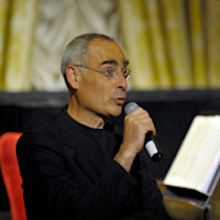Let’s talk about you: what is your background, what do you teach, and what are your research interests?
My name is Giovanni De Zorzi, I am an associate professor in Ethnomusicology (L-Art 08) and I teach four courses: Fundamentals of Ethnomusicology (FT0432) and Contemporary Popular Music (FT0434), both for the Bachelor's degree; Ethnomusicology (FM0076) for the Master's degree; Middle Eastern and Central Asian Musical Traditions (LT4085) for the Bachelor's degree of the Department of Asian and North African Studies (DSAAM). The latter course describes my interests and areas of research, which are: Ottoman-Turkish, Middle Eastern (maqām), Central Asian (maqom) and Uighur (muqam) art music. In all of them, the action of Sufism (tasāwwuf) is present. But research is not teaching... and the monographic parts of the Contemporary Popular Music courses dedicated, for example, to Funk, or to Blues, or to Neapolitan song are proof of this.
Tell us about your academic path.
Non-linear. At the age of 22 I left university and only played the saxophone, living off music for about ten years. In the mid-90s, however, I began to feel drawn towards other types of music, and towards another instrument: the ney. At that time there was not much information and, after a clarifying conversation with the brilliant musicologist Giovanni Morelli, who I had always kept in touch with and who is a professor at the Department of Art History and Criticism, I re-enrolled at the university. This is how I began my journey in Ethnomusicology, graduating with Professor Maurizio Agamennone, who has become a dear friend, and starting with my dissertation my journey into the ney, which continues to this day.
What are your professional references?
In this new journey I have met many mentors, listed here in alphabetical order: musicologists and musicians Maurizio Agamennone, Laurent Aubert, John Baily, turcologists Giampiero Bellingeri and Michele Bernardini, musicologists and musicians Veronica Doubleday, Jean During, Kudsi Erguner, Walter Zev Feldman, Giovanni Giuriati, Rachel Harris, Fikret Karakaya, Ted Levin, Enzo Restagno, Razia Sultanova, Martin Stokes, and Owen Wright, whose example I am trying to follow.
What has given you the greatest satisfaction in your career?
Besides typical academic activities (a lot of writing, lectures, dissertations, too many administrative matters, etc.) I have played with the group I direct, the Ensemble Marâghî, in various events and I have also personally organised concerts of 'other' music for the Intercultural Institute of Comparative Music Studies of the Giorgio Cini Foundation, as well as for the MiTO 'Settembre Musica' Festival. I have also been featured on the radio and in videos, but in all cases I would not speak of ‘professional satisfaction’. Really. It is something else, beyond satisfaction.
What is the aspect of your research you are most passionate about?
Being able to play what I study and study what I play. And that's a great privilege.
Have you always known that this was going to be your path?
No, but I proceeded. And then after graduation things went quickly, leading me to the DÉA at the EHESS, to a PhD with La Sapienza and, after seven years, to winning a crowded selection here at the Department of Philosophy and Cultural Heritage.
Can you offer any advice to researchers in the early stages of their career?
Very often I meet young people who have not really made a choice, who attend university without really knowing why, floating around: I left precisely because I did not like this condition. More rarely I also meet young people who have made their choice and who are focused and motivated: this happens especially in Departments that require such a radical choice. I would advise all of them to understand what they are looking for as soon as possible, to stop floating and to follow their passion entirely, swimming with great strokes. Research is not calculated, but driven by passion.

